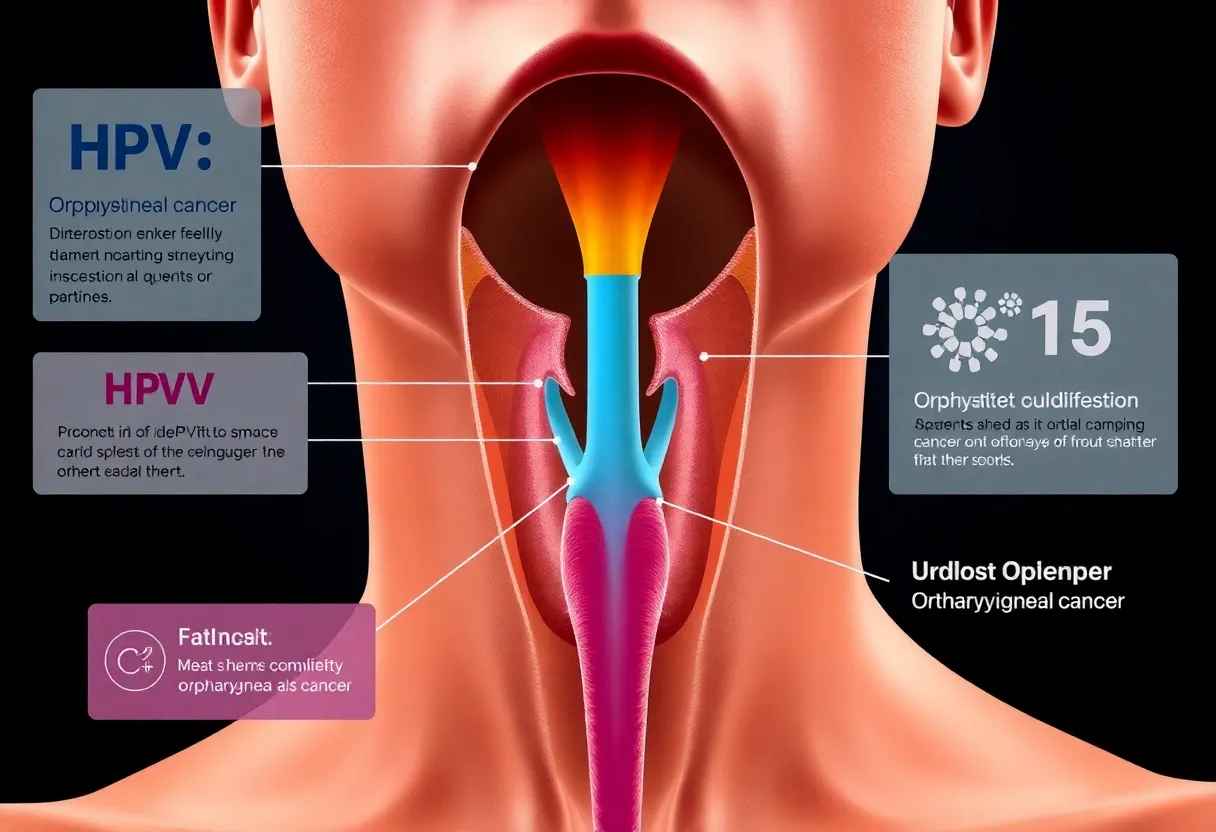News Summary
Recent findings suggest a significant rise in oropharyngeal cancer linked to oral sex, particularly due to HPV infections among individuals with multiple partners.
The Alarming Rise of Oropharyngeal Cancer: Is Oral Sex the New Smoking?
The debate over cancer causes continues to evolve, and recent findings have shifted the spotlight onto a startling new culprit—oral sex. Emerging research identifies this intimate act as the leading cause of throat cancer, eclipsing traditional risks like smoking and alcohol consumption. With throat cancer on the rise, many are left wondering just how serious this situation has become.
HPV: The Hidden Threat
At the center of this troubling trend is the human papillomavirus (HPV), a common sexually transmitted infection with over 100 different strains. Approximately 54,010 adults in America will receive a diagnosis for oral and oropharyngeal cancers during their lifetime, with men being twice as likely to develop throat cancer compared to women.
Familiarity with HPV is essential in understanding this phenomenon, as individuals infected with the virus, particularly those who engage in oral sex with multiple partners, face significantly heightened risks. Research indicates that those with six or more lifetime oral sex partners are an astounding 8.5 times more likely to develop oropharyngeal cancer than those who abstain from oral sex.
A Rise Seen as An Epidemic
Dr. Hisham Mehanna from the University of Birmingham has characterized the steep increase in throat cancer cases over the last two decades as nothing short of an epidemic. Symptoms of oropharyngeal cancer, which include a persistent sore throat, difficulty swallowing, and unexplained weight loss, often go unnoticed until advanced stages. This can lead to life-altering consequences for those affected.
Understanding the Immune Response
While most individuals can clear HPV infections naturally, a small fraction face unique challenges due to immune system defects. In cases where the virus persists, it can integrate into the host’s DNA, resulting in potential cancerous changes in cells. HPV-related throat cancers are more complex than many may realize but often carry a better prognosis than those cancers linked to heavy smoking or drinking.
Chances of Survival
Remarkably, about 70% of patients diagnosed with HPV-positive oropharyngeal cancer survive for five years or longer post-diagnosis. This highlights the importance of early detection and treatment options available, which may include radiation therapy, chemotherapy, surgical removal of tumors, or a combination of these approaches.
Vaccination as a Preventative Measure
As awareness grows, HPV vaccination programs are being rolled out across various countries to combat cervical cancer, and these initiatives could also help reduce oropharyngeal cancer risks. Some nations have even adopted gender-neutral HPV vaccination policies, extending recommendations for vaccination to boys as well.
Despite these efforts, challenges remain. High levels of vaccine hesitancy fueled by safety concerns, misperceptions regarding necessity, and worries about promoting promiscuity hinder vaccination rates. Data from 2020 revealed that only 54.3% of U.S. adolescents aged 13 to 15 received the recommended doses of the HPV vaccine.
The Impact of the Pandemic
The recent COVID-19 pandemic has complicated vaccination campaigns, resulting in increased general vaccine hesitancy. In the U.S., approximately 61% of teens were up to date with their HPV vaccinations pre-pandemic, but that number is in jeopardy of declining further.
Preventative Actions: A Call for Awareness
The ideal time for vaccination is between ages 11 and 12, with catch-up shots available for individuals up to 27 years old. Encouragingly, behavioral studies reveal that around 80% of adults in the UK have engaged in oral sex at some point in their lives, indicating a widespread exposure to the potential risks associated with HPV.
With about 8,300 people diagnosed with throat cancer annually in the UK alone—accounting for 1 in every 50 cancers and predominantly affecting adults over 55—the urgency for widespread education, prevention, and treatment cannot be overstated.
The Bottom Line
The ongoing crisis surrounding oropharyngeal cancer demands immediate attention. Awareness of HPV’s role in throat cancer, coupled with proactive vaccination measures, could significantly reduce the number of cases in the years to come. The implications are both profound and daunting, calling for a collective effort to inform, protect, and possibly save lives.
Deeper Dive: News & Info About This Topic
HERE Resources
Revolutionary Lung Bus Program Launches to Combat Dust Diseases in Regional NSW
Wrestling Star EJ Nduka Becomes a Free Agent After AEW Contract Expiration
Former AEW Star EJ Nduka Becomes a Free Agent Following Contract Expiration
New Horizons for EJ Nduka as AEW Contract Expires
Mesothelioma and Asbestos Claims on the Rise: Sokolove Law Offers Help
Malignant Pleural Mesothelioma: A Silent Killer
Tragic Asbestos Link: Family Seeks Answers in Wake of Loss
Tragic Car Meet Crash Claims Life of Young Driver in Wixams
Restarting the Asbestos Case: New Evidence Unfolds in Court
The Legal Battle Unfolds in the Asbestos Removal Case



















